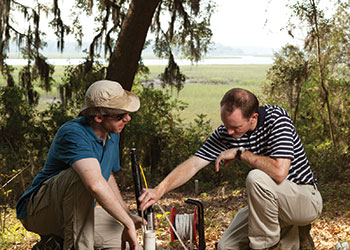Stono Preserve
Growing an Environment of Philanthropy

“If the frail ecology of our planet is to survive, we must be guardians as well as gardeners.” So said John Henry Dick, who entrusted his beloved Stono Preserve to the College of Charleston Foundation upon his death in 1995. And so the College protects and preserves Stono Preserve as a living laboratory for environmental education, ecological research and historical discovery.
During the course of the BOUNDLESS Campaign, the College partnered with a number of generous and forward-thinking donors to amplify the environmental relevance and academic value of Stono Preserve. These investments helped to establish Stono Preserve as a hub of environmental research and historical discovery, while also providing a platform for responsible, sustainable stewardship of the property’s dynamic acreage.
The first step in the restoration of Stono Preserve was a grant from the Post & Courier Foundation that supported the construction of a 3.2 mile ADA-compliant interpretative nature walking trail, providing visitor access to the diverse habitats of the property.
A grant from the Gaylord and Dorothy Donnelley Foundation supported the development and execution of a comprehensive forestry management plan, including the establishment of 150 acres of longleaf pine forest. Native to the Southeast but victim to years of over harvesting and decimation, a longleaf pine forest can grow for more than 300 years and is home to numerous species that can only survive in its unique habitat, the most famous being the red-cockaded woodpecker. Arborgen LLC donated 74,000 seedlings to support the forest’s creation.
Once Stono Preserve was restored to its natural splendor, further philanthropic investments expanded the property’s access, infrastructure and academic offerings. The Golden Pearl Foundation’s generous commitment created a student-run, sustainable garden that is managed by graduate students in the environmental studies program. A 10-year grant from the U.S. Fish and Wildlife Service supported the formation and study of pollinator habitats for the Monarch butterfly. A matching grant from the Spaulding-Paolozzi Foundation supported the construction and outfitting of two state-of-the-art field research stations that facilitate undergraduate, graduate and faculty coursework and research.
Additional investments in Stono Preserve come from Renee Buyck Romberger ’81 and her husband Randy, whose estate gift will support operations at Stono Preserve, and from Bill and Sharon Asbill, whose gift supported infrastructure for the student garden.
View all impact stories »